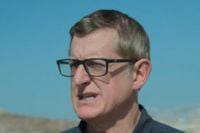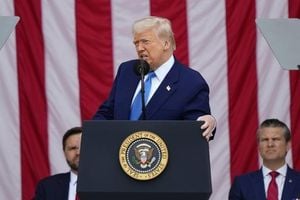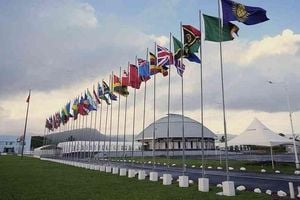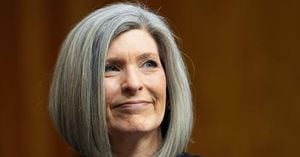Louis Theroux has made a notable return to television with his latest documentary, The Settlers, which aired on BBC Two on April 27, 2025. This film serves as a follow-up to his 2011 documentary Ultra Zionists, revisiting the Israeli settler movement in the Palestinian territories after a 14-year hiatus. In this new installment, Theroux delves into the complexities of life in the West Bank, where settler ideologies have gained unprecedented political traction.
Upon his return, Theroux encounters a range of individuals, including Ari Abramowitz, a Texan settler who dismissively states that they do not recognize Palestine as a nation. This sentiment echoes throughout the documentary, showcasing the stark divide between settlers and Palestinians. Theroux also meets Issa, a Palestinian man who provides a guided tour of Hebron, a city heavily impacted by military checkpoints and restrictions.
The documentary has garnered significant attention, receiving a four-star review from The Independent, which praised Theroux’s unique interviewing style. Phil Harrison, the reviewer, noted that Theroux's ability to create a comfortable environment allows his subjects to speak candidly. “As ever Louis Theroux doing great work,” one fan remarked on social media, highlighting the effectiveness of Theroux's approach.
However, the film is not without controversy. Critics have pointed out that Theroux's film showcases extremist views without adequately addressing counter-narratives. During his interviews, he encounters a rabbi who refers to Palestinians as "savages" and "camel drivers," and engages in multiple discussions with Daniella Weiss, described as the "godmother" of the settler movement. Weiss, who has been a prominent figure in the Israeli settler community for decades, boasts of her role in establishing numerous illegal outposts in the West Bank. She dismisses accusations of settler violence as "incomplete narratives," a claim that Theroux challenges directly.
In one particularly heated exchange, Theroux confronts Weiss about her views on settler violence. When she denies its existence, he responds with frustration, labeling her perspective as "sociopathic." This moment encapsulates the tension that Theroux navigates throughout the documentary, as he balances his trademark calm demeanor with moments of palpable anger in response to the extremist ideologies he encounters.
The documentary also highlights the everyday realities faced by Palestinians living under Israeli occupation. Theroux captures the oppressive atmosphere in cities like Hebron, where Palestinians endure systematic violence and restrictions on their movement. Activist Issa Amro poignantly describes the situation, stating, "It's about fragmented life, restricted life for Palestinians. No quality of life." This stark contrast between the lives of settlers and Palestinians is a recurring theme in the film.
Throughout the filming process, Theroux and his crew faced numerous confrontations, including instances where armed settlers pointed guns at them while visiting Palestinian homes. In one scene, Theroux is seen asking armed soldiers to lower their weapons, a moment that underscores the volatility of the situation in the region. His experiences reflect the daily intimidation that Palestinians endure, a reality that many viewers may find shocking.
Moreover, the film does not shy away from the political implications of the settler movement. It showcases a settler jamboree where far-right figures, including Israeli National Security Minister Itamar Ben Gvir, openly advocate for establishing illegal settler outposts in Gaza. This blatant disregard for international law raises critical questions about the future of the region and the rights of Palestinians.
Despite the film's critical lens on the settler movement, some viewers have expressed concern that Theroux has not provided equal airtime to opposing viewpoints, such as those of Israeli activists who oppose the expansion of settlements. Critics argue that this oversight could lead to a skewed understanding of the complex dynamics at play in the region.
In the aftermath of the film's release, social media reactions have been mixed. Some users accused Theroux of fostering anti-Semitism, while others praised the documentary for its unflinching portrayal of the realities faced by Palestinians. “Incredible film,” one viewer commented, emphasizing the importance of shedding light on these issues at a critical time.
As the documentary continues to spark debate, it serves as a reminder of the urgent need for dialogue and understanding in a region fraught with tension. Theroux’s work highlights the complexities of the Israeli-Palestinian conflict, inviting viewers to confront uncomfortable truths about the ongoing occupation and the impact it has on both communities.
Louis Theroux’s The Settlers not only revisits a contentious subject but also challenges viewers to consider the broader implications of settler ideologies and their impact on peace efforts. As the documentary is currently available to stream on BBC iPlayer, it remains to be seen how audiences will respond to the stark realities presented within its narrative.





